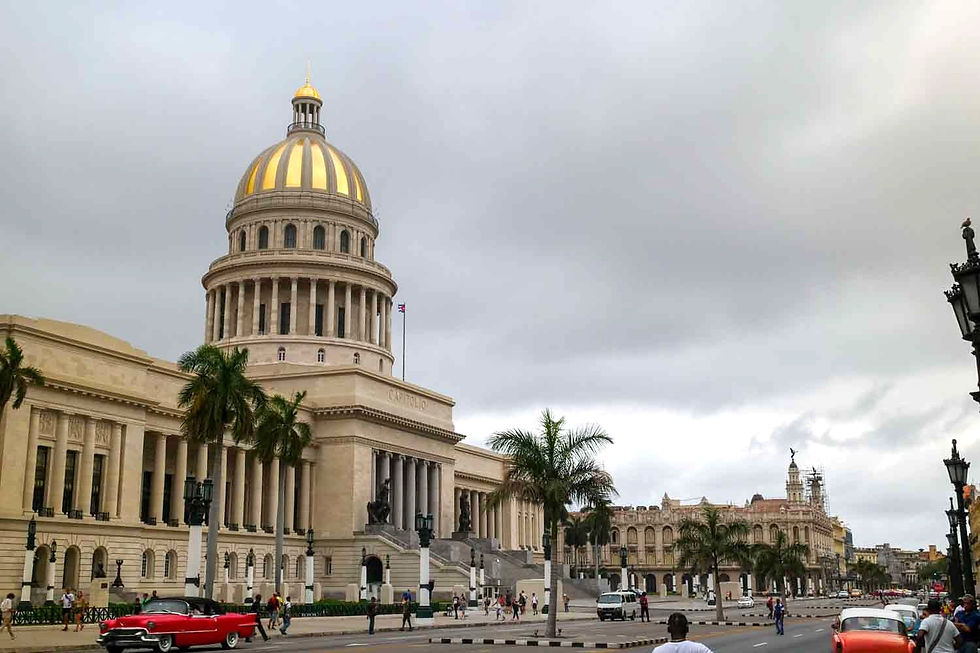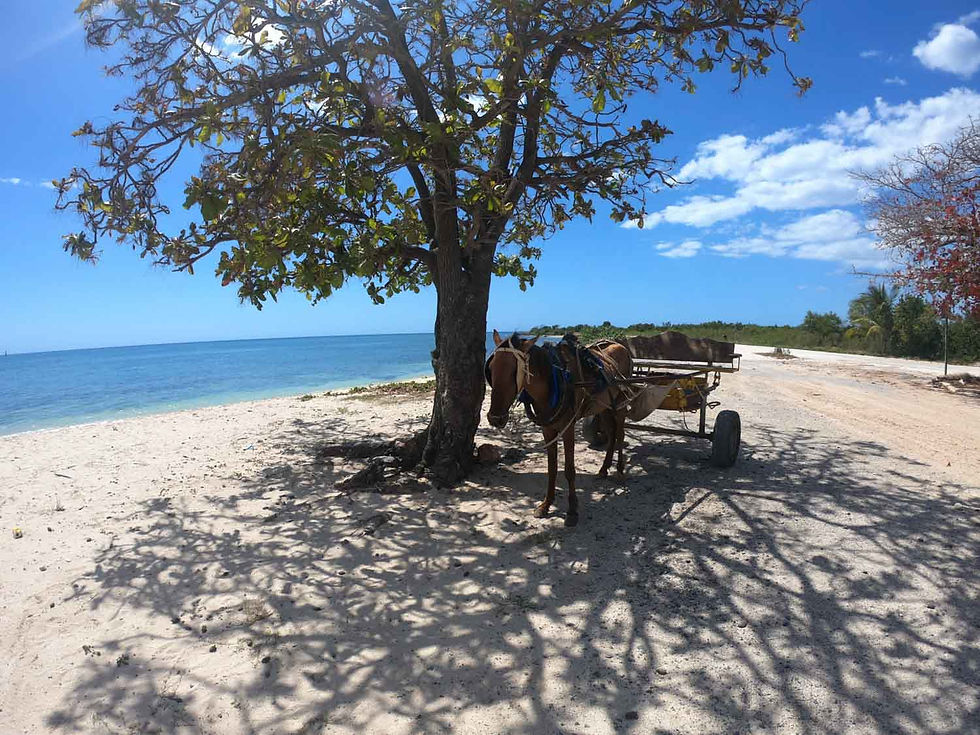Visas, Internet And More - Cuba's No.1 Survival Guide For The Savvy Traveller
- BITE THE WORLD

- Jun 19, 2020
- 7 min read
Updated: Jan 1

Cuba is nowadays within reach for most travellers. Even Americans can visit Cuba, although with some restrictions. Now, there is a certain degree of planning before any trip to the biggest of the islands in the Caribbean. This is in part due to the political system and the US embargo that is still in place to this day.
Some of the things that many travellers take for granted, like easily accessing their money, using the internet, getting an Uber, finding accommodation, etc., are not that straightforward in this corner of the world. These things may be perceived as trivialities if you've been living under a rock for the past 20 years, but most people will probably want to ensure they have a worry-free holiday and will do their homework before travelling to Cuba.
This is why I put together this survival guide: to ensure you can easily access your dosh while in Cuba, surf the web hassle-free, obtain your visa quickly, and much more, so read on!
1. Money, Credit Cards And Paying For Things In Cuba

Money is not that easy to get in Cuba. The reason is that due to the US embargo, most credit cards don't work. Even when you're trying to book, say, accommodation when you're still at home, your card may not work, and you may have to do it through a travel agent, or perhaps you can download a VPN app - CLICK HERE if you want to find out which apps you should download before your next trip.
The most sensible thing to do before travelling to Cuba is to call your bank beforehand to ensure your card can be used in Cuba. Even if you can use your card in Cuba, not talking to your bank may mean they will also just automatically put a block on it after you attempt to withdraw or pay with the card in Cuba. ATMs are far and few in most cities, and some won't just work or may stop working while you're using them. You should also consider taking some cash with you in case anything goes haywire.
Now, make sure you take Euros, British Pounds, or Canadian Dollars as US Dollars, which are accepted in Cuba, but there's a special tax you must pay when exchanging them. Money can be exchanged at the airport, at the cruise terminals or at a Cadeca (currency exchange house), which can usually be found inside your hotel. The currency you'll be given is CUCs, which are intended to only be used by tourists, while CUPS are the official national currency and are worth way less than CUCs. I found that CUCs are generally accepted by most people in Cuba and didn't really need CUPs during my trip.
Tip: In order to avoid potential credit card fees consider getting yourself a card with no associated transaction fees like a Monzo, Starling, Revolut, etc.
2. Internet In Cuba And How To Use It

Internet in Cuba is a recent advent. Up until some years ago, there was virtually nowhere where you could find Wi-Fi. That's changed in recent years, but there are still some peculiarities when it comes to accessing the World Wide Web! First, the internet comes in the form of a prepaid card where you need to scratch off a code and then use that same code to connect to the internet with your device. The internet won't be fast, and most cards are only valid for an hour of internet service, so if you only use some minutes, you can disconnect and reconnect later to use your remaining time. The Wi-Fi hotspots are usually close to big hotels, or around popular areas like squares and parks. You can get your internet cards from hotels or from the only mobile/internet phone shop in the country, ETECSA.
3. How Easy Is It To Use A Phone In Cuba

Most Cubans have a mobile phone nowadays; whether they actually work or not is another story. Mobile coverage is still very limited in Cuba, and if you intend to use your own mobile, be warned that roaming charges will cost you a fortune. If you want to save some money, you can consider getting a Surfroam Sim Card. One other option is, of course, buying a Cubacel SIM card (operated by ETECSA) when you get to Cuba.
4. Staying Healthy In Cuba

Cuba despite all the odds has one of the best healthcare systems in the Caribbean, this doesn't mean however you should lower your guard and forget basic safety measures. Avoid drinking tap water, and wash your hands frequently, especially before eating. Bring along any medicines you may need as well as personal hygiene products since these may be difficult to come across in a communist country. Don't forget your mosquito repellent and, obviously, your health insurance, which you can get HERE.
5. How To Obtain Your Visa

Just so we're clear before I tell you about the ins and outs of getting your visa to visit Cuba, you can't visit the island without one, and you can't get either upon your arrival!
The easiest way to get your visa is to make sure that before you buy your flight, the airline company you'll fly with already provides one for you when you purchase your ticket. This usually means that when you arrive at the airport, you then just need to simply fill out the official form, pay about 50 USD, and Bob's your uncle!
If there is a Cuban embassy where you live or you can easily get to one, you can call them, book an appointment and get your visa. Another easy option is to apply for a visa online through a third-party company that will sort out all the paperwork for you and post the visa to your home address, obviously at an added cost.
Tip: If you're flying from Cancun to Havana with Interjet, you can get your visa at the airport, just make sure you arrive with plenty of time in case there are any queues. This is how I got my visa and I must say it was a very straightforward process.
6. Getting To And From The Airport When You Get To Havana

When you get to the airport in Cuba, you'll have to fill out some form, which will be handed to you as soon as you get off your plane, or if this doesn't happen, just look around for them after you make it through the first passport check and there will surely be some, just don't forget to bring a pen. After you fill out the form (basically a goods declaration), hand it over to the person collecting it before you exit the airport. Before you get in any taxi, you should try to either withdraw some money or exchange some of it in order to pay for your ride to the city centre. After you've done this, there will be plenty of taxis waiting to ferry tourists from the airport to virtually anywhere you'd like to go. There are obviously no private taxi companies, and all taxis are state-owned. Taxis charge a fixed fee of approximately 25USD if you're staying in Havana city centre.
7. Finding Accommodation in Cuba

Cuba accommodation options boil down to casas particulares (Airbnb accommodation) and hotels. If you're wondering how to book your accommodation, the answer is to do it well in advance of our arrival. You can book your accommodation via Airbnb, although you may need to do so with a non-American credit card.
Casas particulares tend to be really inexpensive when compared to hotels.
I had to stay in a hotel due to a flight being cancelled and for a basic room in a soviet-style building, where the corridors leading to the rooms looked more like the set of a horror movie than an actual hotel, I, unfortunately, paid about 100USD just for one night!
If you're staying in a casa particular you'll most likely be offered the option to have the host cook you breakfast for a small fee on top of the room price. Another advantage of staying in a casa particular is the fact that your host will be able to book you a taxi if you need one for usually less than if you'd do so yourself, they'll also give you tips about tours and if required call a cousin, son or acquaintance who will surely take you around to see the sights. So If hotels are your thing and money isn't a problem, you could stay in one, but why bother when you can instead stay with locals?
8. Transport & Getting Around In Cuba

If you don't hire a car in Cuba, you'll have to get around either by bus or taxi. These two options won't be cheap, but HEY, there are no other options, except maybe booking an expensive internal flight if, say, you want to travel from Havan to Santiago De Cuba on the other end of the island.
Viazul buses can and should be booked online before you set foot in Cuba, as the buses tend to be fully booked some days ahead of their departure. When in any city, there will be different types of taxi options: Cocotaxis (a type of motorbike taxi shaped like a coconut), regular imported cars which function like taxis, and classic cars, which also operate as taxis (these tend to be pricier), tuk-tuks (usually a bicycle welded to a rickshaw) and coletivo taxis which are a bit more difficult to spot as they look just like a random old car that many Cubans still drive nowadays, but inside there will probably be 7 or 8 people (and maybe a chicken or two).
9. How Far Does Your Money Stretch In Cuba?

The answer to the above question is not very far! Cuba was more expensive than I expected, and apparently, even locals complain about the high inflation rates and high cost of living. Food and transportation are very expensive in Cuba. It'll be difficult to stick, for instance, to a budget of less than 40USD per person per day in Cuba, so be prepared for this.
10. When Is The Best Time To Visit Cuba?

The answer is whenever you can. Obviously, dry season is your safest bet, usually between November and April, but you could even visit Cuba during hurricane season and be blessed with warm temperatures and plenty of sunshine; but hey, check the weather forecast before you go.
11. Is Cuba A Safe Travel Destination?

Yes and no. Cubans live under a sort of dictatorship where political dissidents are not tolerated, so don't get into long-winded political discussions with locals and NEVER criticise the government, as you could be prosecuted. Other than this, crime is, according to locals, almost nonexistent in Cuba, and all the available data online points to that. I never felt unsafe during my time in Cuba. There are, however, plenty of scams that you should be aware of before you go to Cuba, so CLICK HERE if you want to avoid getting scammed when you arrive in Cuba, as I, unfortunately, did on my third day in Havana.
PIN IT


Comments